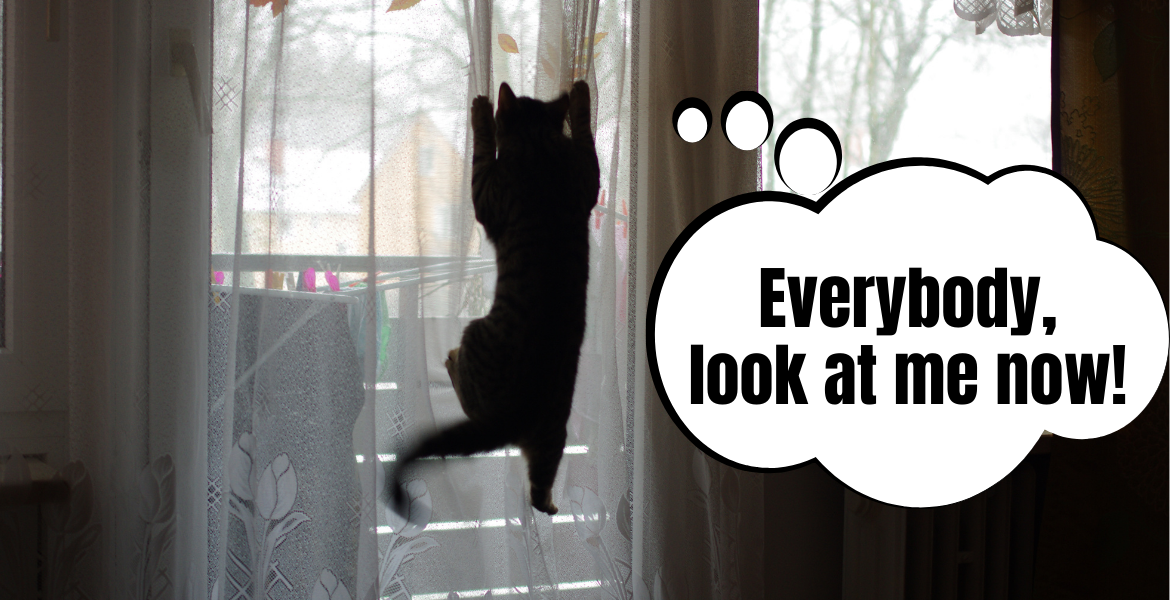Cats are independent creatures by nature. Every fabCat Guardian knows that cats only listen to us when they feel like it or when they can gain something from it. However, when it comes to a cat wanting something from us… the circus-like antics cats resort to in order to grab our attention reach masterful levels! Some cats can flawlessly play the role of true attention-seekers and blackmailers to achieve their goals. But why are they so stubborn in demanding all our attention, and how can we live in harmony with an attention-seeker without going crazy?
How do attention-seeking habits develop in cats?
Cat behaviors, both positive and negative, always result from one of two factors: feline nature or experience. Cats navigate their daily lives based on what their inner tiger would do or rely on past experiences to decide whether an action is safe and will bring them the desired results. For attention-seeking cats, experiences, and especially the promise of a reward associated with performing specific actions, are particularly important. If persistent meowing in the kitchen in the past made a human get up and fill the bowl (even if it wasn’t empty), why not use this technique again?
An attention-seeking cat has one mission: to do everything to make a human pay attention to them. The reasons for such behavior can be diverse: a cat may be bored, in need of companionship, hungry, frustrated, stressed, or sick. If getting the human’s attention is essential, every cat will become an attention-seeker and demand a reaction from the Guardian. However, some furballs abuse such mechanisms because they enjoy having our attention 24/7.
What do cats do to grab their Guardian’s attention?
Before we dive into the list of behaviors that can be a cat’s way of getting your attention, we want one message to be very clear: cats are not malicious! Even an attention-seeker, who tries to draw the Guardian’s attention to themselves forcefully, does not do so to annoy or irritate. Their goal is one: to fulfill a certain need in their life. And how can they strive for it?
- Knocking various items off shelves and counters. It’s a classic move! A cat’s curious nature combined with a desire to play ensures that anything falling down is a guarantee of good entertainment. However, if your cat is extremely bored and knocking things down has elicited any reaction from you in the past, doing it again may be a feline way to redirect your attention to the cat and their needs.
- Seeking closeness. Regardless of whether your cat is a lap cat or prefers to keep their distance around you, when it comes to getting your attention, they will find a way. An attention-seeking cat will walk on your keyboard, sit right in front of the computer screen, wag their tail in front of the TV, rub against your phone when you’re talking, and if that doesn’t work, they may resort to headbutting, pawing, or even nipping at your ankles.
- Tracking your movements. When a cat follows you everywhere, tracks your every move, and as soon as you look at them, purrs and runs in the opposite direction: congratulations! Your cat just invited you to a crazy game and won’t take no for an answer 🙂
- Furniture destruction. Scratching furniture, climbing to the highest shelves, jumping on the fridge, and walking on curtain rods – such behaviors are entirely natural for cats and fulfill their need for movement, exploration, and muscle strengthening. However, when a cat does it persistently, when safer options are within paw’s reach, it may be a sign that they seek your attention. Most likely, they just want to play, so grab a wand toy and let the fun begin, fabCat!
- Ingesting non-food items. We’re entering the territory of behaviors that can be potentially dangerous for a cat. When a cat is bored, frustrated, or desperately wants to draw human attention for any other reason, their instinct may be to nibble on plants, dig out trash from the bin, bite (and eat) small objects within reach, or even consume their own toys. So, always keep an eye on everything your cat can access and exhaust their feline energy before it directs them towards more destructive ways to kill time.
Any behavior that deviates from the norm, intensifies in specific situations, or simply doesn’t fit your cat’s character can be treated as a signal of seeking attention. And none of the behaviors mentioned above should be ignored. Of course – a cat may accidentally scratch the couch when the scratching post is too far away. They may occasionally chew on flowers or dig in the soil because it’s just interesting. However, the escalation of such behaviors is a clear signal from the cat that something is wrong, and your reaction is necessary. It’s just another element of feline communication.
Why does your cat demand attention?
Cats usually try by any means to attract their humans’ attention in two situations:
- when they’re in trouble, in pain, hungry, or need human assistance,
- when they’re bored, don’t know what to do with themselves, and need mental or physical stimulation that only a human can provide.
The behaviors we listed in the previous paragraph are natural for cats and learned based on experience. If our cat knows that we will always react to their meowing, they may sit under our chair and meow until we look their way. When scratching furniture works like a charm and always makes us get up to move the cat away from the upholstery, can you imagine a better way to get a human out of a chair when the cat has a matter to discuss? It’s a simple yet very effective mechanism, and attention-seeking cats know exactly how to use it.
Don’t get mad at your cat. If they seek attention, they have a reason
As we mentioned at the beginning: cats are not malicious. And although they are experts at hiding various ailments and weaknesses, they also know they can rely on their humans. As fabCat Guardians, we take responsibility for every aspect of our cats’ lives as soon as they join our family. And cats are well aware of this, so they turn to us for help when needed.
So don’t be indifferent, fabCat, to your cat’s actions. Take them to the veterinarian to rule out any medical reasons for their behavior. Consult a behaviorist if you don’t know how to deal with cat habits. Working with an attention-seeking cat is often a lesson in patience, skill in ignoring the cat when they demand attention, and at the same time, paying attention to and satisfying their needs in such a way that they don’t have to demand it. And if you need ideas to enrich your cat’s environment so they never get bored, check out our blog: https://blog.mykotty.pl/en/2023/12/11/house-of-luxury-how-to-craft-the-ultimate-purrfect-space-at-home-and-beat-feline-boredom/




